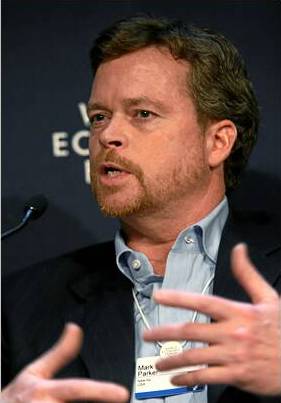
Mark Parker is an American businessman who served as the CEO of Nike, Inc. from 2006 to 2019. He was born on October 21, 1955, in Poughkeepsie, New York, and raised in Pennsylvania. Parker’s father was a World War II veteran who worked as a civil engineer, and his mother was a homemaker.
Parker attended Penn State University, where he studied industrial design. After graduating in 1977, he began his career at Nike as a footwear designer. He quickly rose through the ranks, eventually becoming the Vice President of Global Footwear in 1993.
In 1998, Parker was named the General Manager of the Nike Brand, overseeing all aspects of the company’s operations. He was promoted to the position of Nike’s President and CEO in 2006, succeeding William Perez.
Under Parker’s leadership, Nike experienced significant growth and expansion. He helped launch the Nike+ digital platform, which allowed athletes to track their workouts and connect with other athletes around the world. Parker also oversaw the development of Nike’s Flywire and Flyknit technologies, which helped reduce the weight of athletic shoes and improve their performance.
Parker retired as CEO of Nike in 2019, but remains involved with the company as its Executive Chairman. According to Forbes, Parker has a net worth of $800 million as of 2023.
Outside of Nike, Parker is known for his passion for the arts. He is a collector of contemporary art and serves on the board of trustees for the Portland Art Museum. Parker is also a member of the board of directors for The Walt Disney Company.
In addition to his success in business and the arts, Parker is also a dedicated philanthropist. He and his wife, Kathy, have made significant donations to Oregon Health and Science University, the University of Oregon, and other charitable organizations.
Overall, Mark Parker’s legacy as CEO of Nike and his contributions to the world of athletic footwear and apparel have helped shape the industry and inspire athletes around the world.
Here’s a timeline of Mark Parker’s life and career:
- 1955: Mark Parker is born on October 21 in Poughkeepsie, New York.
- 1977: Parker graduates from Penn State University with a degree in industrial design.
- 1979: Parker joins Nike as a footwear designer.
- 1989: Parker becomes the Division Vice President of Consumer Product Marketing at Nike.
- 1993: Parker is named Vice President of Global Footwear at Nike.
- 1998: Parker becomes the General Manager of the Nike Brand.
- 2006: Parker is named President and CEO of Nike, succeeding William Perez.
- 2012: Parker leads Nike’s launch of the Flyknit technology, which revolutionizes the design of athletic shoes.
- 2015: Parker helps launch the Nike+ app, which allows athletes to track their workouts and connect with other athletes.
- 2019: Parker steps down as CEO of Nike, but remains with the company as its Executive Chairman.
Throughout his career, Parker has overseen numerous innovations at Nike and helped the company grow into a global brand. His impact on the world of athletic footwear and apparel is significant, and his legacy continues to inspire athletes and designers around the world.
Here are 5 interesting facts and 5 quotes from Mark Parker:
5 interesting facts:
- Parker is an avid collector of contemporary art and serves on the board of trustees for the Portland Art Museum.
- He was the designer behind Nike’s popular Air Jordan III sneaker, which debuted in 1988.
- Parker’s son, Max, is a professional surfer who competes on the World Surf League.
- Parker’s design philosophy centers on creating products that are both beautiful and functional.
- Parker is known for his love of running, and often participates in marathons and other races.
5 quotes:
- “Design is a catalyst for innovation, and innovation drives growth.”
- “We believe that every person is an athlete… and that innovation can make all athletes better.”
- “Ideas are only great when executed brilliantly.”
- “Innovation at Nike is not about dreaming of tomorrow. It’s about accelerating toward it.”
- “The best leaders are those most interested in surrounding themselves with assistants and associates smarter than they are.”









